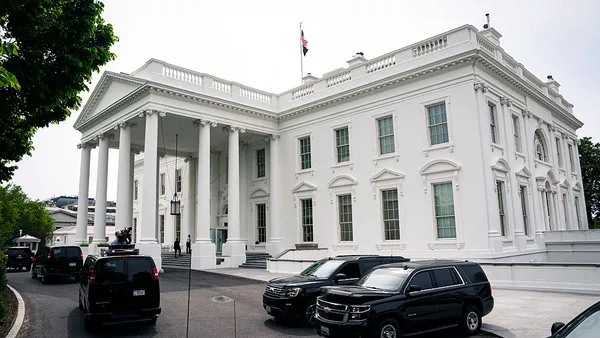Dive Brief:
- A coalition of five contractors' groups, the Alliance for Fair and Equitable Contracting Today, (AFFECT) is suing New York City's Metropolitan Transportation Authority (MTA) in hopes that a federal court will declare the authority's contractor debarment rules unconstitutional.
- The regulations mandate that contractors be debarred for five years if they do not complete a project or its change orders on schedule by more than 10% of the contract term or if their unsuccessful claims for extra costs are 10% or more of the total adjusted contract value, even if the contractors are acting in good faith or their debarment is considered unfair. The MTA can also debar the contractors' parent companies or stakeholders with more than 10% ownership. The regulations apply both prospectively to new contracts and retroactively to all contracts already in existence, according to the lawsuit.
- Debarment removes a contractor’s eligibility for government contracts for a fixed period of time, and attorneys for AFFECT refer to it as a "death penalty" since an MTA debarment could lead to debarment nationwide because contractors are often required to give details about their histories to other agencies.
Dive Insight:
The new regulations, first enacted in June 2019, are part of the MTA's attempt at cutting costs and waste from the agency's construction process, particularly since it is about to embark on a five-year, $51.5 billion plan to upgrade and expand the city's transit systems. As lawmakers were considering the mammoth package, the MTA's biggest ever, there was concern that the agency is not as effective as it could be in both managing its contractors and overseeing project budgets. An article in the New York Times said those inefficiencies have made New York City the most expensive place in the world in which to build subway systems.
But how effective will the new department regulations be in the long run in helping the MTA reach its goal of improved efficiency?
"The potential impact of this rule is unprecedented," said attorney Erik Ortmann, vice-chair of the construction law practice at Kaufman Dolowich Voluck LLP in New York.
Since debarment is mandatory if a contractor runs afoul of the new regulations, he said, a scenario could arise in which one or more companies try to insulate themselves from the repercussions by inflating their bids. Also, the MTA, which has an interest in keeping costs down, could deny a change order or a portion of a change order in such an amount as to trigger debarment, even if the contractor submitted the change believed it to be valid.
Ortmann said that it's possible that AFFECT and the MTA could reach some sort of middle ground, but in the meantime, some contractors that have plenty of work might choose not to bid on MTA jobs.
"The [MTA] is going to need highly qualified contractors to do this work, but, on the other end, they're putting in this draconian rule where there may be contractors that say, 'We're not interested in doing the work,' or, 'Were going to do it at such a high price that it's going to be well above the engineers' estimates because we're accounting for the risk associated with this debarment rule,'" he said.
AFFECT's lawsuit maintains that the MTA's rules regarding debarment are unconstitutional because they violate:
- The Contract Clause by "purporting to substantially modify the terms of contracts in existence at the time of their passage," referring to the regulations being retroactive;
- The Supremacy Clause because the MTA's regulations conflict with and undermine federal objectives connected to federal grants.
- The Dormant Commerce Clause because they place "an unreasonable burden" on interstate commerce.
- Due Process because the MTA's debarment rules "do not provide adequate notice and opportunity to be heard" and create "radical standards" for debarment.
- The First Amendment because they have a "chilling effect" on contractors' decisions to pursue claims.
AFFECT is made up of the General Contractors Association of New York, the New York Building Congress, the Associated General Contractors of New York State LLC, the Building Trades Employers Association and the American Council of Engineering Companies of New York. AFFECT's attorney did not respond to a request for comments.














